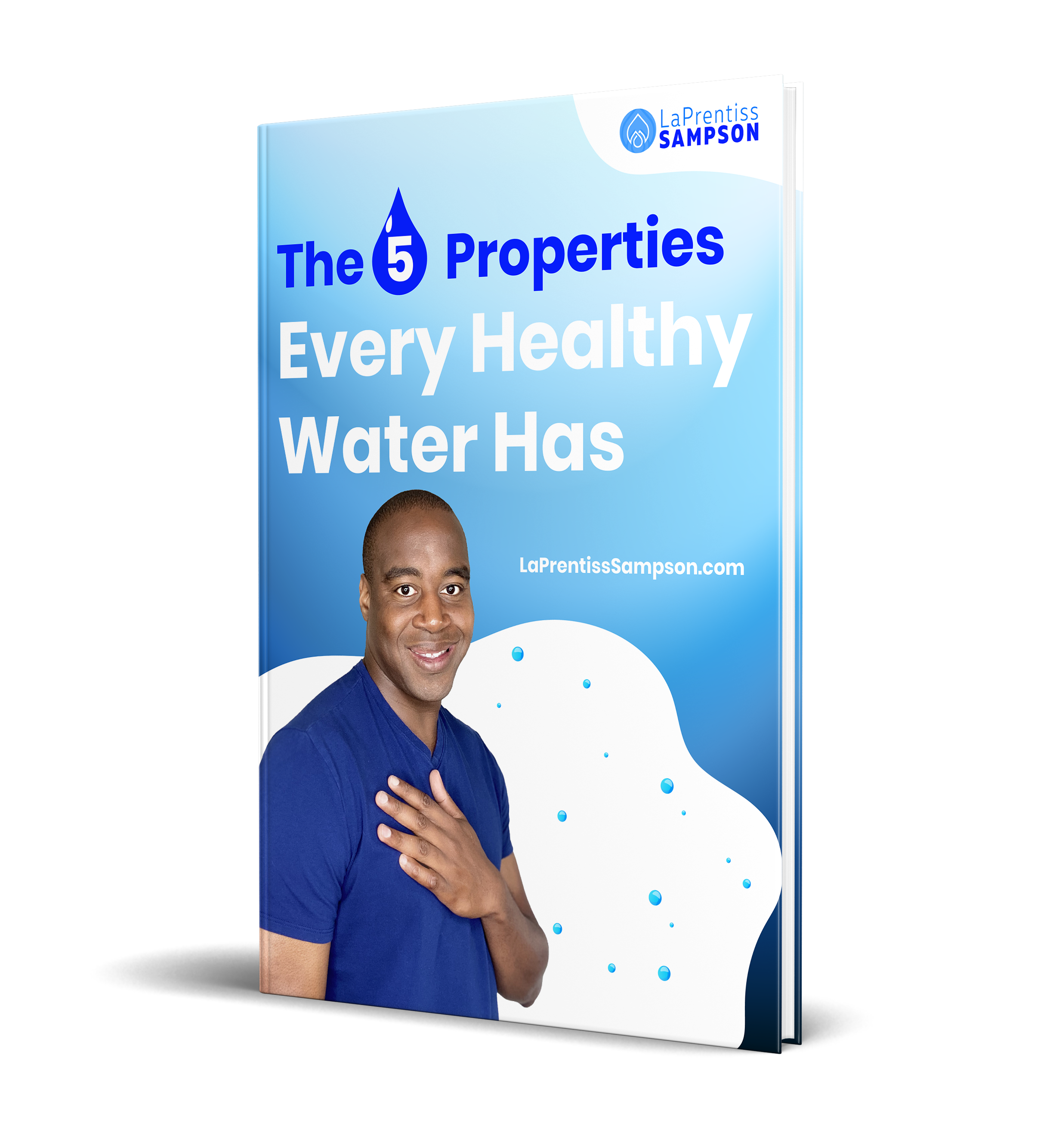In today’s water battle review, we’re going to figure out what is the difference between Fiji water and regular tap water.
Is there a difference, and which water is better?
Well, to find an answer to that question, we’re going to test both of these waters for three specific properties:
- Oxidation
- Alkalinity
- Superior Hydration
Oxidation (Antioxidants)
Our body is 75% water.
By changing that water and making it good for us, we can reach a better health state. We would feel better, have more energy, and be healthier in general.
Why is that important?
Unfortunately, we are completely surrounded by harmful molecules called free radicals.
Free radicals, as mentioned, are all around us. They are found in our food, in the air that we breathe, in or electronics, even in the water we are drinking.
Free radicals are responsible for cellular disbalance. They are robbing electrons from our healthy cells, making them inflamed and oxidized.
Thankfully, we know about antioxidants.
Antioxidants have extra electrons, meaning that they can give away their own electron and protect our cells.
That’s how antioxidants make us young, healthy and are often referred to as “fountain of youth”.
But how do we test our water if it has antioxidative properties?
ORP Test
It’s quite simple.
We know that free radicals are positively charged. On the other hand, antioxidants are negatively charged.
ORP meter is a device that measures oxidative-reduction potential. By inserting a probe inside water, it will show us either a positive or negative value, depending on the oxidative or antioxidative nature of the water.
Remember, we are looking for a negative value. A positive value indicates water that is bad for our health.
Let’s try out Fiji water!
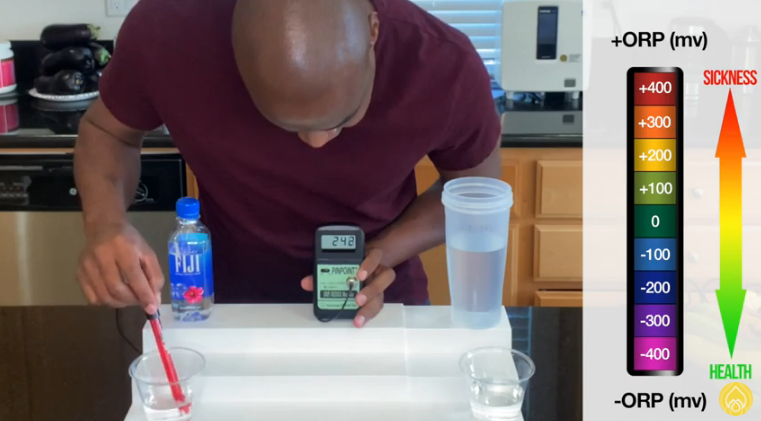
We got a 240+ value, which is not good. Now, let’s see if our tap water will do any better.
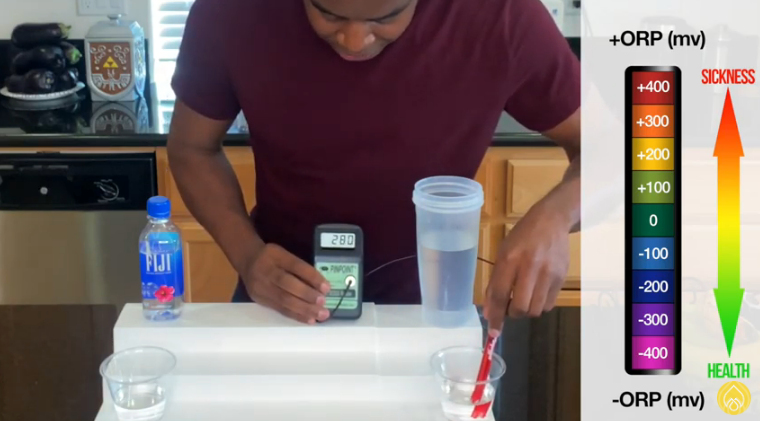
Unfortunately, no.
Our tap water came back with an even higher value.
The Fiji water did a little bit better, but both waters are oxidizing us.
Alkalinity and Acidity
The second test we’re going to do is - Alkalinity.
Cancer, sickness, and disease can not survive in an alkaline environment. That’s why we want our body to stay slightly alkaline.
For example, our blood has a pH level of 7.365. By consuming alkaline products, our blood has no problem staying at that pH level.
However, by using acidic stuff, such as cigarettes, alcohol, fast food, our body has to do everything in its power to keep that pH level.
And how?
By taking the nutrients from your own body.
Your own body will start taking nutrients from your joints, bones, skin, and ligaments. That’s how we end up with medical conditions such as eczema, brittle bones, osteoporosis, and more.
To test our water pH level, we’re going to use pH indicator drops.
If our water is alkaline, the color of the water will change to blue, light purple, or dark purple. On the other hand, yellow, orange, and red color indicate acidic water.
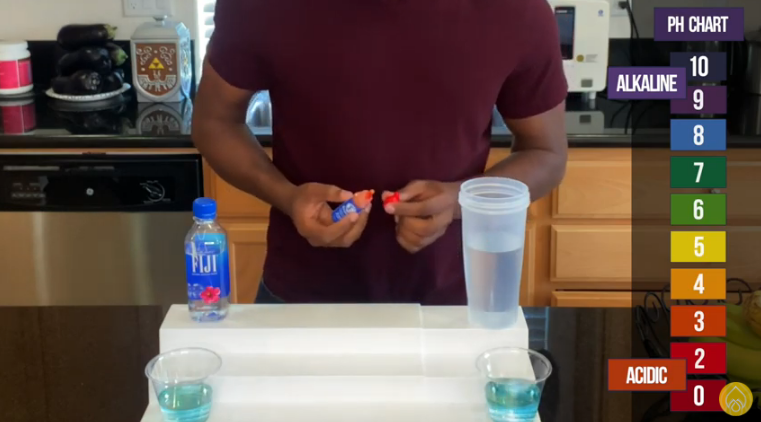
Well, right now, they both look even.
But, are they really alkaline as they show?
There is a simple trick to find out the water’s true alkalinity and acidity. If we blow some air into the glass, the water that has “fake” alkalinity, will change its color.
However, if the water is truly alkaline, it will not change the color, no matter how much and long we blow the air into it.
So, let’s see if the water color will change.
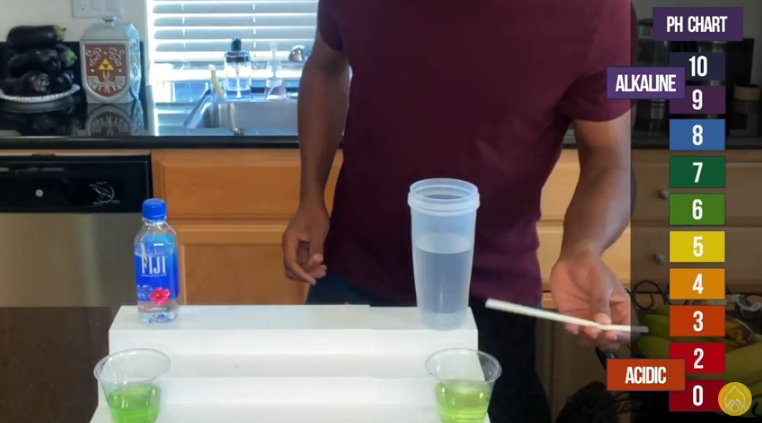
Both waters changed color from blue to green, meaning that they are not that alkaline as you might initially think.
But, when it comes to alkalinity, they both look the same.
Superior Hydration
Our final test is for hydration abilities.
Superior hydration is a term that we use to measure water’s hydration ability. How good is the water we are drinking at hydrating us?
To find out if Fiji water is better than regular tap water, we’re going to use a teabag.
The tea bag represents our body in a dehydrated state. Can water penetrate a teabag, take the nutrients out, and ultimately - make tea or the teabag will stay dry inside?
Let’s test it out!

Unfortunately, both Fiji and tap water hardly made any tea. Such water is not good at hydrating us.
But, if you are asking yourself if there is water that is good at hydrating us - you are lucky!
The water that I am drinking enters a teabag without any problems and makes tea instantly.

On top of that, this water is very alkaline and has antioxidative properties!
Extra: Chlorine Test
One more extra test - Chlorine!
Disinfection is the last stage of water preparation that has the purpose of eliminating microorganisms. Chlorine is the most commonly used disinfectant.
We know that our tap water contains chlorine. But what about Fiji water?
We’ll use some chlorine indicating drops to find out the answer. If the water turns yellow, that’s a good sign of chlorine presence.
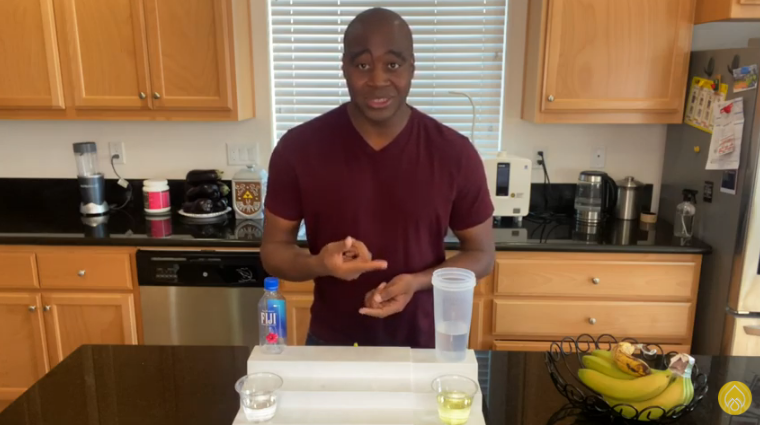
Although chlorine is good at what it does, it causes serious health issues.
Luckily, Fiji water has no chlorine.
Conclusion
What’s the final verdict? Which one of these waters is better? Tap water or Fiji?
Well, they both look more or less the same. By buying Fiji, we are paying for non-chlorine water, but apart from that, there is no bigger difference.
To help you in your journey towards true wellness, I made a report about the five properties every healthy water has. I personally use these tools in my life right now!
If you want something that's better, water that actually improves your health and life quality, contact me and do the best for your well-being!
For more content like this make sure you subscribe to my Youtube channel and check me out on Facebook to get more tips on boosting your wellness.


